A lady said to me not long ago: "You speak Polish and English, but you sing in German. I don't understand."
I replied: "What don't you understand? If I had an opportunity to practice the other language which I learned at school, I would."
The first time was in primary school when I was 14. Not that I volunteered to do that, oh no. I was part of the school choir then. Our music teacher, who was also the choir director, and the teacher of Russian, chose me to sing a song in Russian during a school assembly.
Poland was part of the Soviet block at that time, and every year, schools and bigger workplaces observed "the days of Soviet culture and science". The observance was mandatory and some state events related to those "days" were always reported on TV.
Anyhow, the song which I sang solo at that assembly was done to mark the above-mentioned observance in the school papers/report. Its lyrics were nothing political, though. The text (children appropriate) was about Cinderella and the ball she attended at the Prince's castle. The tune was nice, but the refrain part was full of high notes and difficult to sing. Luckily, the music teacher arranged it in a way that the school choir supported me in that. Being shy, I did not enjoy standing in front of the entire school and doing my solo part, but I did like the song.
A few years earlier, my first unofficial solo presentation took place. One day, an unexpected visitation occurred in our local youth club. Neighborhood kids (including myself) spent their after-school time in the club, doing various activities and playing games under the supervision of the club instructor. Quite out of the blue, a group of ladies, delegates from Siberia appeared in the club. My guess is that they had probably been sent there by some city officials. Certainly, it was not an accidental matter.
Anyway, the club instructor was told to entertain the ladies with the kids' performance. Since we had not worked on any program like that, it was quite a desperate situation. The counselor asked us (kids) whether anybody would want to/dare to sing/dance or do whatever proper in front of the visitors. I was one of very few who agreed. Well, I just felt how helpless the situation was. What I did - I sang some notes of a popular Russian song about gingerbread cookies. However, I knew only a few Russian words of the song, the rest was la, la, la. I also played one melody on the xylophone (I was part of the club xylophone group then). Since it was all without prior practice, to my horror, I happened to play out of tune as well.
To my surprise, my performance made a positive impression on the visitors. One lady asked me about my name and address as she wanted a Polish pen pal for her daughter, who was about my age. The girl's name was Lena and we later exchanged letters for some time.
Decades later, I was part of an international EU educational program. Then, we learned the traditional songs of all the project partners (in their native tongues). The languages were, English, German, Czech,
Slovenian,
Bulgarian,
Italian (Sardinian song),
and Cypriot.
The most important side of singing in a foreign language is the correct pronunciation of the song words. Naturally, understanding the text adds more sense to it as well. During the project, both the prior and the latter were provided by the project partners.
In quite a different program, we cooperated with an Israeli school. From time to time, the teacher and her class sent us some videos and we made some too. I taught my students an old song in Yiddish (of Polish or Russian roots). No, I do not know the language. Just found the song lyrics and their English translation. The rest meaning pronunciation came "by ear". The kids enjoyed singing the song and making the video.
All in all, singing in German in Texas is not such a big deal. However, I admit it may be found very unexpected. Anyhow, I did learn some German in Poland. Nevertheless, a few years ago, I did not have the faintest idea I would sing in the language here. Mysterious are the ways...

.jpg)





